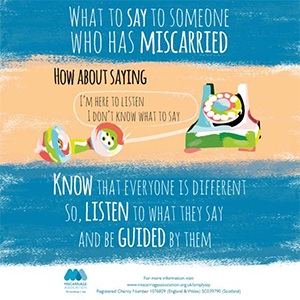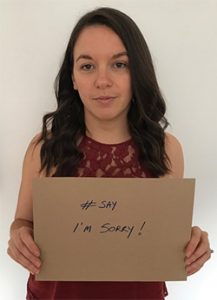Supporting someone through pregnancy loss
 When someone you know, such as a friend, family member or colleague, has a miscarriage, or an ectopic or molar pregnancy, it can be hard to know what to say. You might worry about saying the wrong thing, or you might feel that it would be better to say nothing at all.
When someone you know, such as a friend, family member or colleague, has a miscarriage, or an ectopic or molar pregnancy, it can be hard to know what to say. You might worry about saying the wrong thing, or you might feel that it would be better to say nothing at all.
We’ve talked to a lot of women and their partners about comments they found helpful after pregnancy loss – and the things that they’d prefer people not to say. Everyone’s different, of course, and what one person has appreciated, another has found upsetting. That’s why it’s always important to listen to the individuals involved and be guided by them.
“You don’t need to have experienced miscarriage or say some deeply insightful thing to be helpful, you just need to be honest and ask them to tell you what you can do to help.” – Lizzie
Below, you can find some suggestions about how to support someone who has experienced pregnancy loss. You might find our leaflet, Supporting someone you know, helpful too.
Talking about miscarriage and pregnancy loss
Simply say… ‘I’m sorry’

Even at the earliest stages of pregnancy, women and their partners often feel a real connection to their baby, and will grieve for this baby and for the future they had imagined. It can be hard to find the right words to comfort someone who is experiencing this type of grief, but many people say that just having their loss acknowledged is helpful.
You might want to say:
“I’m very sorry that you have lost your baby.”
“This must be really difficult for you.”
Or even:
“I don’t know what to say.”
“When I went back to work I still remember people who said ‘I’m sorry, it must be awful are you okay?’ That is all people need to say. It is a bereavement. People mistake it for something different, but you are dealing with the loss of someone who meant the world to you and it needs to be treated with the same level of empathy.” – Paul
Things not to say
Occasionally comments that you make with the best of intentions, may upset someone who has experienced a miscarriage. Often these are comments that try to explain or rationalise the miscarriage, or put a positive spin on it.
Some examples might be:
“Don’t worry, you’re young. You can always have another baby.”
“It wasn’t meant to be.”
“It was probably for the best.”
“At least you have other children.”
“I don’t want to hear any comment that starts with the words ‘at least’. ‘At least you are young’, ‘at least you can conceive’, or, for me the worst one, ‘at least it wasn’t a real baby yet.’ All I wanted was for someone to give me a hug and acknowledge what had happened.” – Amy
If you can’t find the words
You might be able to support someone just by sitting and listening to them talk, or giving them a hug. Sometimes actions rather than words are the best and simplest ways of providing comfort. If you can’t see them face to face, calls, WhatsApp and text messages (e.g. ‘I’m sending you a hug’) can make a real difference, especially if they are feeling isolated.
You can download one of our Virtual Hugs to send to someone on your phone and let them know that you’re thinking of them.
“I just wanted someone to talk to and listen to me.” – Michelle
You might want to offer to do something practical to help, such as pick up shopping or take around a meal.
Or you might like to buy them a specialist pregnancy loss card, like this one, available in Card Factory stores or online here.
Keeping in touch
You might think it’s best to give people space and privacy after a pregnancy loss, but this may leave them feeling isolated. If you’re not sure, perhaps you could send a card or a brief text or email just to let them know you’re thinking of them.
“Acknowledging their loss and how hard it must be is much more helpful than trying to diminish it… ‘Do you want to chat?’ was a really helpful question, or even give options – ‘do you want a coffee/chat/distraction/some space?’. Sometimes just hearing ‘I’m thinking of you’ was all I needed.” – Rachael
Difficult situations
It can be difficult to know how to support someone who has had repeated losses. You may feel there’s nothing else you can say, or perhaps you think they may be less upset this time round. In fact, they’ll probably appreciate your support even more.
“With each miscarriage, people were finding it more difficult to know what to say. They found it easier not to say anything…” – Caroline
If you are pregnant or have a young child yourself, you may wonder whether you should visit. After a pregnancy loss, some people will find the sight of pregnant women and babies upsetting, but that’s not the case for everyone. Perhaps you could send a card or a text and check how they feel before visiting.
It can also be a very difficult and confusing time when someone is pregnant again after loss. We shared some ideas about how you might support someone who’s pregnant after loss when talking to BBC Radio 4 Woman’s Hour, which you can read about here.
When your child has a loss
If your child experiences miscarriage, ectopic or molar pregnancy, they may look to you especially for comfort. Your first concern will be for them and their partner, but you may also be experiencing a sense of loss for the grandchild you were looking forward to.
If you have experienced pregnancy loss yourself, you may find those memories returning, adding to your sadness. And if you are a mother whose daughter has miscarried, you may even wonder if you are somehow to blame by passing on some medical or genetic condition, unlikely though that is. If this is worrying you, it’s best to seek advice from your GP.
We’re grateful to Gillian Thornton and to Platinum magazine for allowing us to share her reflections here.
Don’t underestimate the difference you can make with quiet, consistent empathy and understanding when they are needed – and with normality when they are not.
Pregnancy loss and mental health
Some people find that pregnancy loss can cause, or worsen, mental health problems. You may find it even harder to know how to offer the right support. Here are some additional things to think about.
People told us that seeking professional help sometimes feels overwhelming. You could help them decide what they want to say, or offer to come with them to appointments. It may help to research support options, find contact details and make phone calls. Mind has some good information on supporting someone to seek help.
They may behave in ways that you find upsetting or hurtful. People often take difficult feelings out on the people they are close to. Remind yourself that it’s these emotions speaking right now – not them.
Your own wellbeing is important too. Talk to someone you trust, ask for help if you need it and make sure you take time for yourself.
It may also help to read our information on looking after your mental health during and after pregnancy loss.
Talking to the Miscarriage Association
If you’d like further advice on supporting someone you know through pregnancy loss, you can call the Miscarriage Association helpline, or you can contact us through Live chat, or email.
Phone: 01924 200799 (Monday to Friday, 9am-4pm)
Email: info@miscarriageassociation.org.uk
Personal experiences
Click on the links below to read the full stories from the women and men whose quotes appear on this page.
You can also read about others’ experiences in the Your Stories section of our website.

